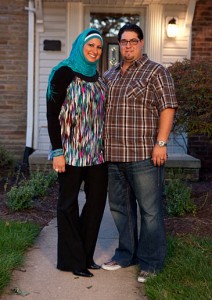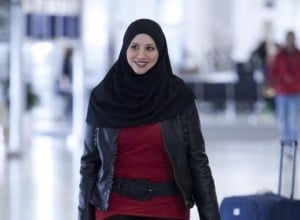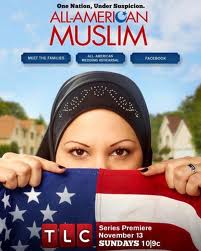 This is a guest post by Jerry Park, originally published on Patheos’ “Black, White, and Grey: Where Christianty and Sociology Meet” blog.
This is a guest post by Jerry Park, originally published on Patheos’ “Black, White, and Grey: Where Christianty and Sociology Meet” blog.
In a previous post I talked some about the non-Christian religious diversity among Asian Americans, and I mentioned some of the research that shows that since 9/11 most white Christian Americans still know little of their non-Christian friends be they Buddhist, Hindu, or Muslim. Intrepid media makers have tried to address this problem by showcasing life in one of the densely-populated Muslim American areas in the country: Dearborn, MI. The first one (which has been very helpful in the classroom) is the 30 Days experiment by Morgan Spurlock.
For those unfamiliar with this series, director Morgan Spurlock asked his friend David, a white evangelical Christian from West Virginia, to try to spend 30 days as a Muslim in Dearborn. His task is to 1) act according to Muslim traditions including appearance and diet, 2) study the Qur’an daily, and 3) grow a beard. David is the perfect person for this kind of experiment as he articulates his feelings to the camera during that month in 2004 (approximately). David is honest about his fears, his biases, but he’s also open. He’s willing to take a step out of his life in West Virginia to try out what life might be like for a group that he only knows about through media portrayals.
From this show I learned a lot about the particularities of Muslim American life. I learned about the five pillars of Islam, daily life, a few language lessons, a visit inside a mosque, a clothing store, and a Muslim butcher’s market. In short, the main message I got was that Muslim American life has unique characteristics like one expects of ethnic communities, just like Greek American life in My Big Fat Greek Wedding. But apart from the specifics of dress, language, and diet, there’s little else that would make Muslim Americans different from Catholic Americans and their particulars .
Since this documentary is now nearly five years old (which seems outdated to some younger people) I was pleased to see that TLC was now showing a new documentary, All American Muslim. This is a multi-episode series and follows 4 Muslim American families living in, where else, Dearborn Michigan. Over the course of a few months we get another look into life in this particular community of Muslim Americans, and after 4 episodes so far I get a fairly different picture about what life is like for Muslims in America compared to what I saw in the 30 Days documentary. It isn’t that I noticed some shocking theology that proves an anti-Muslim conspiratorialist fantasy. It’s that I noticed how diverse Muslim Americans negotiate their identity with mainstream American culture. Unlike the previous show which portrayed conventional middle class Muslim American sensibilities in Dearborn, this one showed a surprising array of expressions of contemporary Islam in America. Gendered expression of religion is one example. I realize my observations are biased as a male, so with that in mind, the most surprising element was the variation in appearance by the Muslim American women. Clearly head coverings are an optional expression of devotion which some women did not partake, and the kind of conservative modesty I associated earlier with Muslim American women was now diversified to include more expressive fashion. The men for their part look no different from white male middle class America. So just like the rest of American culture, regardless of religion, American Muslim women embody what they believe are the norms they should conform to. For some it’s appearing in traditional garb, and for others it is to blend in with contemporary fashion (which bears no resemblance to traditional garb). The men however embody masculinity by conforming to the relatively limited range of styles available.
Moreover what I clearly picked up too was how remarkably “Protestant” these Muslim Americans were – by this I mean their work ethic. One particular example of this is the football coach. Coach Zaban stated that he had never missed a day of coaching in well over a decade, and indeed he was torn about losing that streak in order to meet the President of the United States. What kind of person struggles with this kind of dilemma? The kind of person who elevates virtues like hard work, ascetic dedication and commitment to craft over and above leisure and “worldliness.” Sociologist Max Weber writing in the early 20th century described this as the “Protestant Work Ethic” in his famous treatise by that same name. David Stacy, the white evangelical who participated in the 30 Days experiment observed the same thing: Muslim Americans are hard-working people. So despite these attempts to point out to non-Muslim viewers how typically American and in some ways Protestant Muslim Americans are, organizations like this one have successfully convinced national businesses like Lowe’s to pull their advertisements from this show.
What concerns me is not that this group aims to take down this TV show; it’s that they received support in the mainstream. This group’s website says they have “not experienced this strong of a response on any other issue during the past 23 years.” Their tactic conveys a symbolic message of religiously-influenced intolerance. Stated sociologically, the dominant religious group in America asserts its dominance by alienating minority non-Christian Americans by pressuring neutral businesses to cease support of this programming which in turn motivates the media producer to cancel the show – this effectively silences this affirming portrayal of a maligned minority religious group. For all of the concerns by Christians over mass media’s corrosive effects, it seems like positive portrayals of diverse Muslim Americans are the least of these problems.











